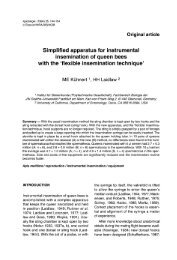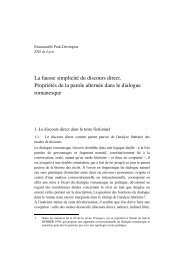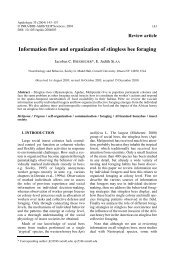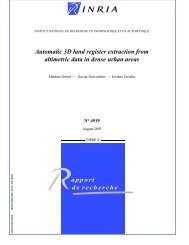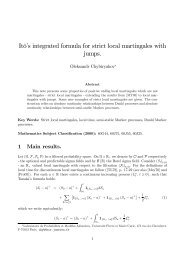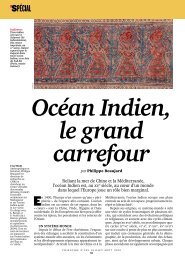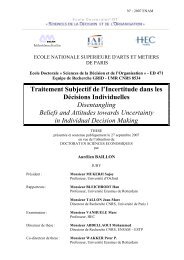Itineraries of Palestinian refugees: Kinship as resource in emigration.
Itineraries of Palestinian refugees: Kinship as resource in emigration.
Itineraries of Palestinian refugees: Kinship as resource in emigration.
You also want an ePaper? Increase the reach of your titles
YUMPU automatically turns print PDFs into web optimized ePapers that Google loves.
halshs-00342285, version 1 - 28 Nov 2008<br />
"As scholars <strong>of</strong> transnationalism have been argu<strong>in</strong>g for some time now,<br />
people at home and abroad may operate <strong>in</strong> a s<strong>in</strong>gle social field, or at le<strong>as</strong>t <strong>in</strong><br />
l<strong>in</strong>ked social fields. This applies <strong>as</strong> much <strong>in</strong> the context <strong>of</strong> forced migration <strong>as</strong><br />
with other forms <strong>of</strong> migration. What w<strong>as</strong> a s<strong>in</strong>gle household <strong>in</strong> a conflict area may<br />
subsequently have members ‘at home’ <strong>in</strong> the country <strong>of</strong> orig<strong>in</strong>; <strong>in</strong> neighbour<strong>in</strong>g<br />
countries <strong>of</strong> first <strong>as</strong>ylum; and <strong>in</strong> the wider di<strong>as</strong>pora, <strong>in</strong> countries <strong>of</strong> <strong>as</strong>ylum and<br />
resettlement: we might term this a transnational household."<br />
I will reconstitute through five migratory it<strong>in</strong>eraries the importance <strong>of</strong> the<br />
networks, and more specifically k<strong>in</strong>ship networks, <strong>in</strong> the <strong>Palest<strong>in</strong>ian</strong> migration process.<br />
These it<strong>in</strong>eraries are reconstituted through <strong>in</strong>terviews collected dur<strong>in</strong>g fieldwork <strong>in</strong> south<br />
Lebanon from May 1999 to June 2003. Networks are <strong>of</strong>ten considered <strong>as</strong> someth<strong>in</strong>g that<br />
exists, without empirical evidence <strong>of</strong> their existence be<strong>in</strong>g pr<strong>of</strong>fered, nor concrete c<strong>as</strong>es<br />
<strong>of</strong> their way <strong>of</strong> function<strong>in</strong>g.<br />
C<strong>as</strong>e study #1: Family migration<br />
The story <strong>of</strong> Ayman 12 is a common one, but it po<strong>in</strong>ts both to the strength <strong>of</strong><br />
family ties and their limits due to restrictive state policies. Ayman's father emigrated<br />
from South Lebanon to Iraq <strong>in</strong> 1979. He w<strong>as</strong> work<strong>in</strong>g for a Lebanese company. He<br />
moved back and forth, stay<strong>in</strong>g <strong>in</strong> Iraq for short periods. In 1981, he found a stable job <strong>in</strong><br />
Iraq and decided to stay there, where <strong>in</strong>comes were higher. He managed to br<strong>in</strong>g his<br />
family from Lebanon the same year. They rented an apartment <strong>in</strong> Baghdad where he used<br />
to work. At this time, <strong>Palest<strong>in</strong>ian</strong> <strong>refugees</strong> were granted residency permits and were<br />
allowed to work. Ayman arrived <strong>in</strong> Iraq when he w<strong>as</strong> 9. He went to school, like all his<br />
brothers and sisters. They are all graduated from the University <strong>of</strong> Baghdad. In 1991,<br />
after the Gulf War, his father lost his job, and restrictions on <strong>Palest<strong>in</strong>ian</strong> rights – <strong>as</strong> well<br />
<strong>as</strong> on other Arabs and foreigners – appeared. Ayman's brother, who w<strong>as</strong> an eng<strong>in</strong>eer,<br />
went to Abu Dhabi and found work there. His father also tried to f<strong>in</strong>d a job there, but<br />
<strong>in</strong>comes were too low to support a family, so he decided to stay <strong>in</strong> Iraq. The whole family<br />
lived on the remittances sent by Ayman's brother dur<strong>in</strong>g this period, about $200 to $300<br />
per month. When <strong>as</strong>ked why they did not choose to leave Baghdad and come back to<br />
12 All the names used <strong>in</strong> this paper are pseudonyms.<br />
11



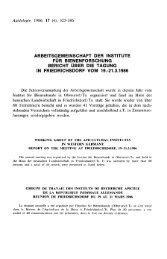
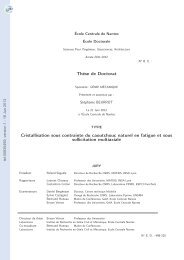
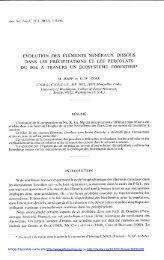
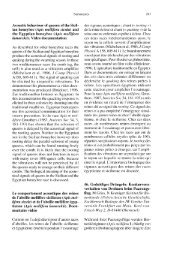
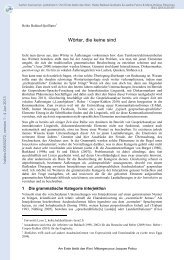
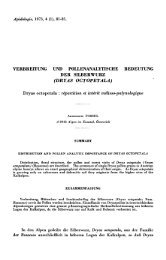
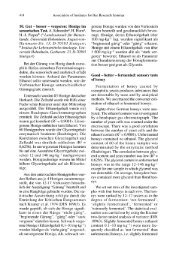
![4 C]-Polyethylenglykol bestimmt, der - HAL - INRIA](https://img.yumpu.com/22454280/1/177x260/4-c-polyethylenglykol-bestimmt-der-hal-inria.jpg?quality=85)
